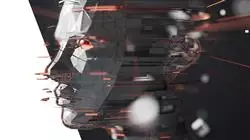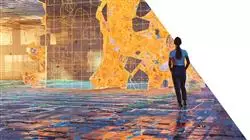University certificate
Accreditation/Membership

The world's largest faculty of design”
Introduction to the Program
Un programa exhaustivo y 100% online, exclusivo de TECH y con una perspectiva internacional respaldada por nuestra afiliación con The Design Society”

Las Tecnologías Aplicadas al Diseño y Aprendizaje Automático están revolucionando la forma en que se diseñan productos, servicios o experiencias. Las herramientas propias de la IA generan ideas originales y sugieren soluciones innovadoras en el diseño, lo que amplía considerablemente el alcance de la creatividad humana. A su vez, puede prever tendencias futuras, lo que contribuye tanto a la planificación estratégica como la toma de decisiones informadas.
Así surge este Postgraduate certificate en Applied Design Technologies and Artificial Intelligence, que brindará a los profesionales herramientas prácticas y conocimientos sólidos para sacarle el máximo partido a las tecnologías en el campo del Diseño. El plan de estudios analizará desde la incorporación de asistentes virtuales hasta la colaboración asistida por IA en equipos editoriales. Así, los alumnos tendrán una visión integral sobre las múltiples posibilidades que ofrecen estas innovaciones. En este contexto, TECH ha desarrollado una titulación académica rigurosa respaldada por el innovador método Relearning.
De este modo, los alumnos disfrutarán de un aprendizaje natural y progresivo, sin necesidad de recurrir a técnicas como la memorización. Además, la accesibilidad será fundamental: solo se requerirá un dispositivo electrónico con conexión a Internet para explorar el material en cualquier momento, lo que permitirá a los estudiantes desprenderse de la necesidad de asistir en persona o seguir horarios estrictos. Adicionalmente, los egresados contarán con acceso garantizado a una Masterclass de la más alta calidad académica, impartida por un afamado docente de gran prestigio, cuya reputación en los ámbitos de la Inteligencia Artificial y el Aprendizaje Automático ha trascendido fronteras internacionales.
Gracias a la colaboración de TECH con The Design Society (DS), el alumno formará parte de una comunidad global dedicada al diseño y su estudio. Podrá acceder a publicaciones de código abierto y participar en eventos colaborativos. Además, la membresía contribuye al mantenimiento de la sociedad y sus plataformas, facilitando la interacción y el acceso a recursos especializados para el desarrollo profesional en diseño.
¿Te gustaría mejorar tus habilidades en Inteligencia Artificial y Aprendizaje Automático? Tendrás acceso a una Masterclass exclusiva y complementaria, diseñada por un reconocido especialista internacional en este campo”
Este Postgraduate certificate en Applied Design Technologies and Artificial Intelligence contiene el programa educativo más completo y actualizado del mercado. Sus características más destacadas son:
- El desarrollo de casos prácticos presentados por expertos en Tecnologías Aplicadas al Diseño e IA
- Los contenidos gráficos, esquemáticos y eminentemente prácticos con los que está concebido recogen una información técnica y práctica sobre aquellas disciplinas indispensables para el ejercicio profesional
- Los ejercicios prácticos donde realizar el proceso de autoevaluación para mejorar el aprendizaje
- Su especial hincapié en metodologías innovadoras
- Las lecciones teóricas, preguntas al experto, foros de discusión de temas controvertidos y trabajos de reflexión individual
- La disponibilidad de acceso a los contenidos desde cualquier dispositivo fijo o portátil con conexión a internet
Gracias a la revolucionaria metodología Relearning, integrarás todos los conocimientos de forma óptima para alcanzar con éxito los resultados que buscas”
El programa incluye en su cuadro docente a profesionales del sector que vierten en esta capacitación la experiencia de su trabajo, además de reconocidos especialistas de sociedades de referencia y universidades de prestigio.
Su contenido multimedia, elaborado con la última tecnología educativa, permitirá al profesional un aprendizaje situado y contextual, es decir, un entorno simulado que proporcionará una capacitación inmersiva programada para entrenarse ante situaciones reales.
El diseño de este programa se centra en el Aprendizaje Basado en Problemas, mediante el cual el profesional deberá tratar de resolver las distintas situaciones de práctica profesional que se le planteen a lo largo del curso académico. Para ello, contará con la ayuda de un novedoso sistema de vídeo interactivo realizado por reconocidos expertos.
¿Buscas automatizar las tareas más repetitivas de tus proyectos? Consíguelo gracias a esta capacitación en tan solo 6 semanas”

Ahondarás en el Diseño Adaptativo y Predictivo mediante una amplia biblioteca de recursos multimedia”
Why study at TECH?
TECH is the world’s largest online university. With an impressive catalog of more than 14,000 university programs available in 11 languages, it is positioned as a leader in employability, with a 99% job placement rate. In addition, it relies on an enormous faculty of more than 6,000 professors of the highest international renown.

Study at the world's largest online university and guarantee your professional success. The future starts at TECH”
The world’s best online university according to FORBES
The prestigious Forbes magazine, specialized in business and finance, has highlighted TECH as “the world's best online university” This is what they have recently stated in an article in their digital edition in which they echo the success story of this institution, “thanks to the academic offer it provides, the selection of its teaching staff, and an innovative learning method aimed at educating the professionals of the future”
A revolutionary study method, a cutting-edge faculty and a practical focus: the key to TECH's success.
The most complete study plans on the university scene
TECH offers the most complete study plans on the university scene, with syllabuses that cover fundamental concepts and, at the same time, the main scientific advances in their specific scientific areas. In addition, these programs are continuously being updated to guarantee students the academic vanguard and the most in-demand professional skills. In this way, the university's qualifications provide its graduates with a significant advantage to propel their careers to success.
TECH offers the most comprehensive and intensive study plans on the current university scene.
A world-class teaching staff
TECH's teaching staff is made up of more than 6,000 professors with the highest international recognition. Professors, researchers and top executives of multinational companies, including Isaiah Covington, performance coach of the Boston Celtics; Magda Romanska, principal investigator at Harvard MetaLAB; Ignacio Wistumba, chairman of the department of translational molecular pathology at MD Anderson Cancer Center; and D.W. Pine, creative director of TIME magazine, among others.
Internationally renowned experts, specialized in different branches of Health, Technology, Communication and Business, form part of the TECH faculty.
A unique learning method
TECH is the first university to use Relearning in all its programs. It is the best online learning methodology, accredited with international teaching quality certifications, provided by prestigious educational agencies. In addition, this disruptive educational model is complemented with the “Case Method”, thereby setting up a unique online teaching strategy. Innovative teaching resources are also implemented, including detailed videos, infographics and interactive summaries.
TECH combines Relearning and the Case Method in all its university programs to guarantee excellent theoretical and practical learning, studying whenever and wherever you want.
The world's largest online university
TECH is the world’s largest online university. We are the largest educational institution, with the best and widest online educational catalog, one hundred percent online and covering the vast majority of areas of knowledge. We offer a large selection of our own degrees and accredited online undergraduate and postgraduate degrees. In total, more than 14,000 university degrees, in eleven different languages, make us the largest educational largest in the world.
TECH has the world's most extensive catalog of academic and official programs, available in more than 11 languages.
Google Premier Partner
The American technology giant has awarded TECH the Google Google Premier Partner badge. This award, which is only available to 3% of the world's companies, highlights the efficient, flexible and tailored experience that this university provides to students. The recognition as a Google Premier Partner not only accredits the maximum rigor, performance and investment in TECH's digital infrastructures, but also places this university as one of the world's leading technology companies.
Google has positioned TECH in the top 3% of the world's most important technology companies by awarding it its Google Premier Partner badge.
The official online university of the NBA
TECH is the official online university of the NBA. Thanks to our agreement with the biggest league in basketball, we offer our students exclusive university programs, as well as a wide variety of educational resources focused on the business of the league and other areas of the sports industry. Each program is made up of a uniquely designed syllabus and features exceptional guest hosts: professionals with a distinguished sports background who will offer their expertise on the most relevant topics.
TECH has been selected by the NBA, the world's top basketball league, as its official online university.
The top-rated university by its students
Students have positioned TECH as the world's top-rated university on the main review websites, with a highest rating of 4.9 out of 5, obtained from more than 1,000 reviews. These results consolidate TECH as the benchmark university institution at an international level, reflecting the excellence and positive impact of its educational model.” reflecting the excellence and positive impact of its educational model.”
TECH is the world’s top-rated university by its students.
Leaders in employability
TECH has managed to become the leading university in employability. 99% of its students obtain jobs in the academic field they have studied, within one year of completing any of the university's programs. A similar number achieve immediate career enhancement. All this thanks to a study methodology that bases its effectiveness on the acquisition of practical skills, which are absolutely necessary for professional development.
99% of TECH graduates find a job within a year of completing their studies.
Postgraduate Certificate in Applied Design Technologies and Artificial Intelligence
Get ready to lead the revolution in design with the innovative Postgraduate Certificate created by TECH Global University. Immerse yourself in a program that merges design creativity with cutting-edge technologies, providing you with the essential skills to excel in the ever-changing digital design scene. Through an innovative syllabus and a 100% online learning methodology, you'll discover how technologies applied to design can empower your creativity. You will learn how to use cutting-edge tools that leverage artificial intelligence to create innovative and visually stunning designs. In addition, you will acquire skills to intelligently integrate emerging technologies into your design projects. From augmented reality to 3D printing, this course will equip you to apply innovative technologies to transform your creative approach. In this way, you will become an in-demand expert, able to take your creative skills to the next level with the transformative power of technologies applied to design and artificial intelligence.
Get qualified with a Postgraduate Certificate in Applied Design Technologies and Artificial Intelligence
Through this high-level program, you'll explore how artificial intelligence can predict trends and anticipate user preferences. You'll learn how to design experiences that not only follow current trends, but also stay one step ahead, providing unique and engaging solutions. You will also master the personalization of the user experience through artificial intelligence. You will discover how to adapt your designs to meet individual needs and preferences, creating highly relevant and engaging products and services. Finally, you will learn how to apply technologies that promote more sustainable and efficient design. You will discover how AI can optimize creative processes and help you make informed decisions that contribute to more environmentally friendly design. From this, you'll envision your future as a leader at the convergence of technologies and design. You'll develop unique skills that will set you apart at the forefront of digital design. Enroll now and start your journey into the design of the future!







